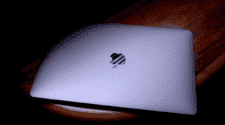More and more users of the new Macs based on the Apple M1 SoC are reporting an alarming problem with their devices’ SSDs. According to MacRumors, this problem is more common among those users who write large amounts of data to SSDs. Shortly after the purchase, they are faced with the problem of rapid degradation of the SSD.
Mac users with Apple M1 are facing a serious SSD issue
In the most severe cases, M1 Macs are said to be consuming as much as 10 to 13 percent of the maximum warrantable total bytes written (TBW) value of its SSD.
Flash memory in solid state drives allows data to be written a specified number of times. The software ensures that the load is evenly distributed over the memory cells of the drive, but there is a time when the drive has been written so many times that it can no longer reliably store data. It is normal for SSDs to degrade or wear out, but SSDs shouldn’t deplete their ability to store data as quickly as new Macs do.
One user reported that his Mac consumed 1% of its SSD in just two months; while another computer with a 2TB SSD lost 3%. Many users agree that newer Macs lose the ability to store data faster than previous models.
So far, Apple has not commented on the situation in any way.
16GB M1 MBP, 2TB SSD, 2 months in. pic.twitter.com/SaSmieaT1s
— David (@david_rysk) February 15, 2021
Tens of thousands of Macs are infected with unknown malware
While news of malware infections on Macs is relatively rare, new information about nearly 30,000 Macs infected is a matter of concern due to its complex nature and lack of information available.
Researchers at Red Canary have discovered a new type of macOS malware they dubbed Silver Sparrow. The malware is strange for many reasons, the main one being that it has remained largely inactive until now. Despite the fact that it exchanges data with the command and control servers once an hour; waiting for the execution of potentially malicious binaries, at the moment Silver Sparrow has not harmed infected computers.
Macs and an unknown malware
In addition to the Intel x86_64 variant, an analog for the Apple M1 was found. Both versions contain “third-party observer binaries” that print “Hello World!” and “You did it!” Displaying such messages on the screen is not a serious problem; but potentially the malware can start performing some work on request from the control servers. Red Canary emphasized that complex infrastructure leverages CDNs and AWS networks effectively, making it difficult to track and remove.
Another interesting fact about Silver Sparrow is that it contains self-destruct mechanisms that remove all traces of malware from infected devices. This mechanism was not observed by default on infected computers; which means that it was loaded randomly based on the fulfillment of currently unknown conditions.
Red Canary reported that as of February 17, 2021, 29,139 macOS devices have been infected in 153 countries.





